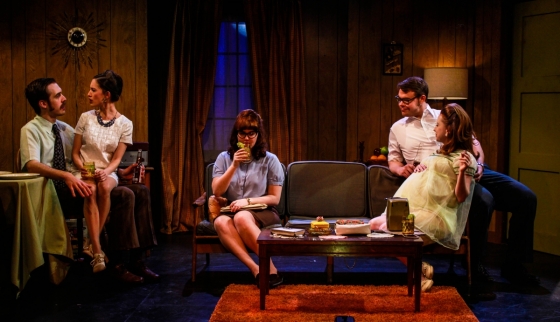
Coinciding with the return of AMC's Mad Men is the current run of actor, director, and playwright Max Baker's new play, Live from the Surface of the Moon, another look at American culture as it runs out the clock on the 1960s. Baker trains his gaze not on the halls of Madison Avenue but on one Cleveland family's wood-paneled living room on the nights of the moon landing and New Year's Eve, 1969. As the play begins, Don (Ian Patrick Poake) and his pregnant wife, Carol (Kate Garfield), have invited their married friends Wendell (Brian Edelman) and June (Breanna Foister) to watch the astronauts step onto the moon; also part of the viewing party are Carol’s father, Joe (Kevin Gilmartin), who lives with them because of his senility, and Holly (Lisa Anderson), a slightly awkward young woman whom Carol hopes to turn from acquaintance to babysitter.
As the gathering progresses, the audience gets a fuller and not always flattering picture of the attendees. Carol shows flashes of resentment at her domestic duties and reflexively corrects her working-class husband's grammar. June is an outspoken women’s libber who name-checks feminist books that she hasn't read and is subtly but clearly offended when her gifting of a used electric can opener doesn't go as she envisioned. She complains about male discrimination even as she wonders how the "midget manager" she had an acrimonious encounter with at a grocery store could have such a large responsibility. Wendell is an inveterate womanizer who flirts with Don's wife at every opportunity but can't stand his own wife saying the word penis in front of his friends.Holly, whom the others think is "weird," is the real progressive in many ways, as well as the most authentic person, at least in her more innocent, undamaged appearance on this first night. While Don rails against the very idea of wanting to be a rock star like Jim Morrison, Holly at least acknowledges the value of the artistic and tries to practice it herself, reading Thomas Hardy and writing poetry of questionable quality.
Ice-cream truck driver Don is a staunch defender of the ordinary. Ironically, the ordinary gets in the way of his ardent desire to witness Americans walking on the moon, when Carol goes (apologetically) into labor. Holly quotes Hardy's assertion that the Titanic and the iceberg that sunk it were "destined to collide," and all of the disparate circumstances here do indeed conspire to bring about a traumatic close to the night--concluded with a dark tableau of 60s household/ gender roles, lit in flickering shadow by the television -- whose ramifications are on display in the second half of the play. In addition to thinking about the tangled webs of cause and effect in our lives, Live From the Surface of the Moon asks questions about memory. How much of the experience of a life is retained? Has Joe lost his memories or merely the ability to articulate them? These questions gain an extra edge because it is easy for both the audience and the characters to forget at times (or ignore) that Joe, from his chair in the corner of the room, serves as a mostly silent witness to almost everything that occurs. Questions of memory are of course linked to questions of time. Wendell floats the idea that all of time, whatever has happened or will happen, takes place simultaneously, yet peppers his conversation with trendy slang in fear of falling behind the times. The couples drunkenly play a game called "History" on New Year's Eve, and there are fleeting, obscure hints of a more complicated history between the two couples, as well as more direct reference to Carol's less-than-perfect childhood with Joe. This intimations characterize the play as a whole, which is more evocative than didactic. Joe's confusion of the painfully earnest Holly with his dead wife, Lilith, and references to women having equal pay within a decade perhaps suggest that Wendell's collapsing of time might in fact be accurate.
The entire cast does stellar work making these characters feel like complex individuals and the relationships feel lived-in, with real history and chemistry. Foister’s June suggests some insecurity beneath the outspoken assertiveness, and Wendell’s shift from charming to threatening as the first act wraps up is nauseatingly effective. While it becomes clear that there is a real affection between Don and Carol, one can also imagine them as one of the multitude of divorced families of the 1970s. Some of the period details, like pregnant Carol's drinking and smoking, are played for laughs, but it never becomes a parody of the era. Consistently funny, sometimes uncomfortable, with a feel that could be described as more realist Albee, Live from the Surface of the Moon avoids nostalgia for a clear-eyed appraisal of America’s multifaceted movement into the unknown. - Leah Richards and John Ziegler
